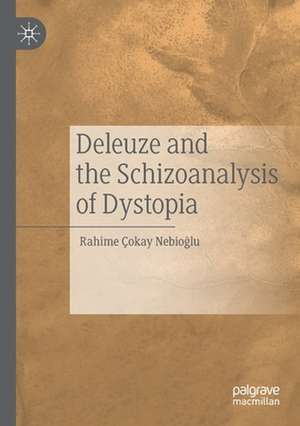Deleuze and the Schizoanalysis of Dystopia
Autor Rahime Çokay Nebioğluen Limba Engleză Paperback – 21 iun 2021
Accompanied by a subtle exploration of earlier and later examples of the genre by George Orwell, Aldous Huxley, Suzanne Collins, Veronica Roth, William Gibson, Max Barry, Dave Eggers, Cindy Pon, and Tahsin Yücel along with rich and nuanced analysis of China Mieville’s Perdido Street Station and Margaret Atwood’s MaddAddam trilogy, the book seeks not only to track the transformation of dystopia in light of worldwide cultural, political and economic transformation, but also to conduct a schizoanalytic reading of dystopia, thus opening up an exciting field of enquiry for Deleuzian scholars.
| Toate formatele și edițiile | Preț | Express |
|---|---|---|
| Paperback (1) | 382.36 lei 43-57 zile | |
| Springer International Publishing – 21 iun 2021 | 382.36 lei 43-57 zile | |
| Hardback (1) | 388.72 lei 43-57 zile | |
| Springer International Publishing – 20 iun 2020 | 388.72 lei 43-57 zile |
Preț: 382.36 lei
Nou
Puncte Express: 574
Preț estimativ în valută:
73.17€ • 76.58$ • 60.90£
73.17€ • 76.58$ • 60.90£
Carte tipărită la comandă
Livrare economică 31 martie-14 aprilie
Preluare comenzi: 021 569.72.76
Specificații
ISBN-13: 9783030431471
ISBN-10: 3030431479
Pagini: 201
Ilustrații: VIII, 201 p.
Dimensiuni: 148 x 210 mm
Greutate: 0.28 kg
Ediția:1st ed. 2020
Editura: Springer International Publishing
Colecția Palgrave Macmillan
Locul publicării:Cham, Switzerland
ISBN-10: 3030431479
Pagini: 201
Ilustrații: VIII, 201 p.
Dimensiuni: 148 x 210 mm
Greutate: 0.28 kg
Ediția:1st ed. 2020
Editura: Springer International Publishing
Colecția Palgrave Macmillan
Locul publicării:Cham, Switzerland
Cuprins
1. Introduction: Postscripts on Dystopia Today- 2. Dystopia from Transcendence to Immanence.- 3. Dystopia after Late Capitalism.- 4. Minoritarian Politics of Contemporary Dystopia.- 5. Schizoanalysis of Contemporary Dystopia.- 6. The Immanence of the New Weird: China Mieville's Perdido Street Station.- 7. The Roads to Immanent Dystopia: Margaret Atwood's The MaddAddam Trilogy.- 8. Conclusion: Contemporary Dystopia as An Art of The Possible.
Notă biografică
Rahime Cokay Nebioglu is a former Fulbright Scholar in the Literature Program at Duke University, USA, and is currently working as a research assistant at Gazi University, Turkey. She also serves as the non-fiction editor of the Journal of Absurdity and Horror.
Textul de pe ultima copertă
This book offers an insightful history of dystopian literature, integrating it within the conceptual schemas of Deleuze and Guattari. Unlike earlier examples of dystopia which depict representations of a possible future that is remarkably worse than present society, contemporary dystopia often tends to portray an almost allegorical re-presentation of present society. Tracing dystopia’s shift from transcendence towards immanence with the rise of late neoliberal capitalism and control-societies, Çokay Nebioğlu skilfully constructs a new taxonomy of dystopian fiction to address this changing dynamic.
Accompanied by a subtle exploration of earlier and later examples of the genre by George Orwell, Aldous Huxley, Suzanne Collins, Veronica Roth, William Gibson, Max Barry, Dave Eggers, Cindy Pon, and Tahsin Yücel along with rich and nuanced analysis of China Mieville’s Perdido Street Station and Margaret Atwood’s MaddAddam trilogy, the book seeks not only to track the transformation of dystopia in light of worldwide cultural, political and economic transformation, but also to conduct a schizoanalytic reading of dystopia, thus opening up an exciting field of enquiry for Deleuzian scholars.
Accompanied by a subtle exploration of earlier and later examples of the genre by George Orwell, Aldous Huxley, Suzanne Collins, Veronica Roth, William Gibson, Max Barry, Dave Eggers, Cindy Pon, and Tahsin Yücel along with rich and nuanced analysis of China Mieville’s Perdido Street Station and Margaret Atwood’s MaddAddam trilogy, the book seeks not only to track the transformation of dystopia in light of worldwide cultural, political and economic transformation, but also to conduct a schizoanalytic reading of dystopia, thus opening up an exciting field of enquiry for Deleuzian scholars.
Caracteristici
Offers an insightful history of utopian and dystopian literature that leads to a new taxonomy of dystopian fiction Integrates the new notions of transgressive and immanent dystopia within the conceptual schemas of Deleuze and Guattari Provides a nuanced and perceptive reading of contemporary dystopian literature
